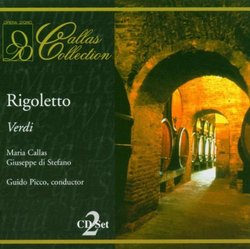| All Artists: Giuseppe Verdi, Guido Picco, Carlos Sagarminaga, Gilberto Cerda, Giuseppe di Stefano, Ignacio Ruffino, Maria Callas, Maria Teresa Garcia, Piero Campolonghi Title: Verdi: Rigoletto Members Wishing: 0 Total Copies: 0 Label: Opera D'oro Original Release Date: 1/1/1952 Re-Release Date: 6/20/2000 Genre: Classical Styles: Opera & Classical Vocal, Historical Periods, Modern, 20th, & 21st Century Number of Discs: 2 SwapaCD Credits: 2 UPC: 723723828323 |
Search - Giuseppe Verdi, Guido Picco, Carlos Sagarminaga :: Verdi: Rigoletto
 | Giuseppe Verdi, Guido Picco, Carlos Sagarminaga Verdi: Rigoletto Genre: Classical
|
Larger Image |
CD Details |
CD ReviewsRough and Ready, but lovable La Cieca | New York New York New York | 09/04/2000 (4 out of 5 stars) "Callas once warned people away from her early Mexico City performances, saying that she at that time sang "like a wildcat." I respectfully disagree with La Divina on this issue: her Gilda is warm and passionate, imbued with the rich musicality she brought to all her roles. So many phrases and whole scenes come richly to life in her treatment. She takes a number of high options then considered standard, such as a series of trills to a solid high E in "Caro nome," a spectacular but inappropriately bombastic finish. The third act is a showcase for authentic Verdian style, with Callas taking big risks (e.g., extreme rubati) that pay off gorgeously. Di Stefano is in good early voice, the top very slightly pinched, but the rest of the voice golden and pingy. He takes an encore of "La donna e mobile," well deserved. Campolonghi is one of those singers about which we say "if only we had him around today," a big voice, lots of personality, if rather crude in style. The conductor is pretty much a mess, and the prompter is noisily present all the time, except for the one time Callas needs him (the beginning of "Tutte le feste") The sounds suffers some distortion in the loud passages, but is acceptable in a historical recording."
|

 Track Listings (15) - Disc #1
Track Listings (15) - Disc #1